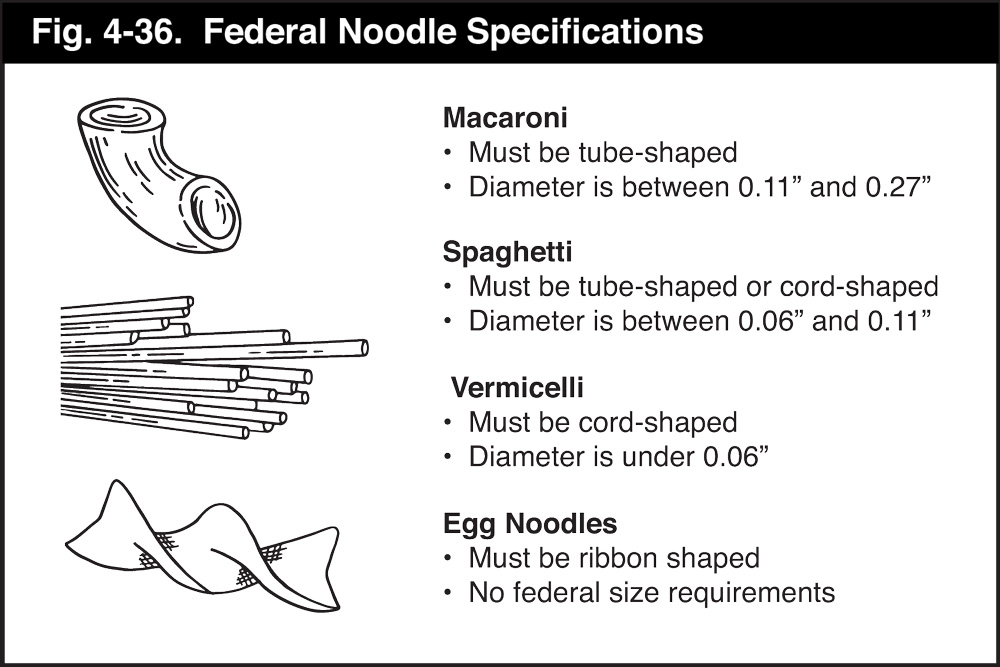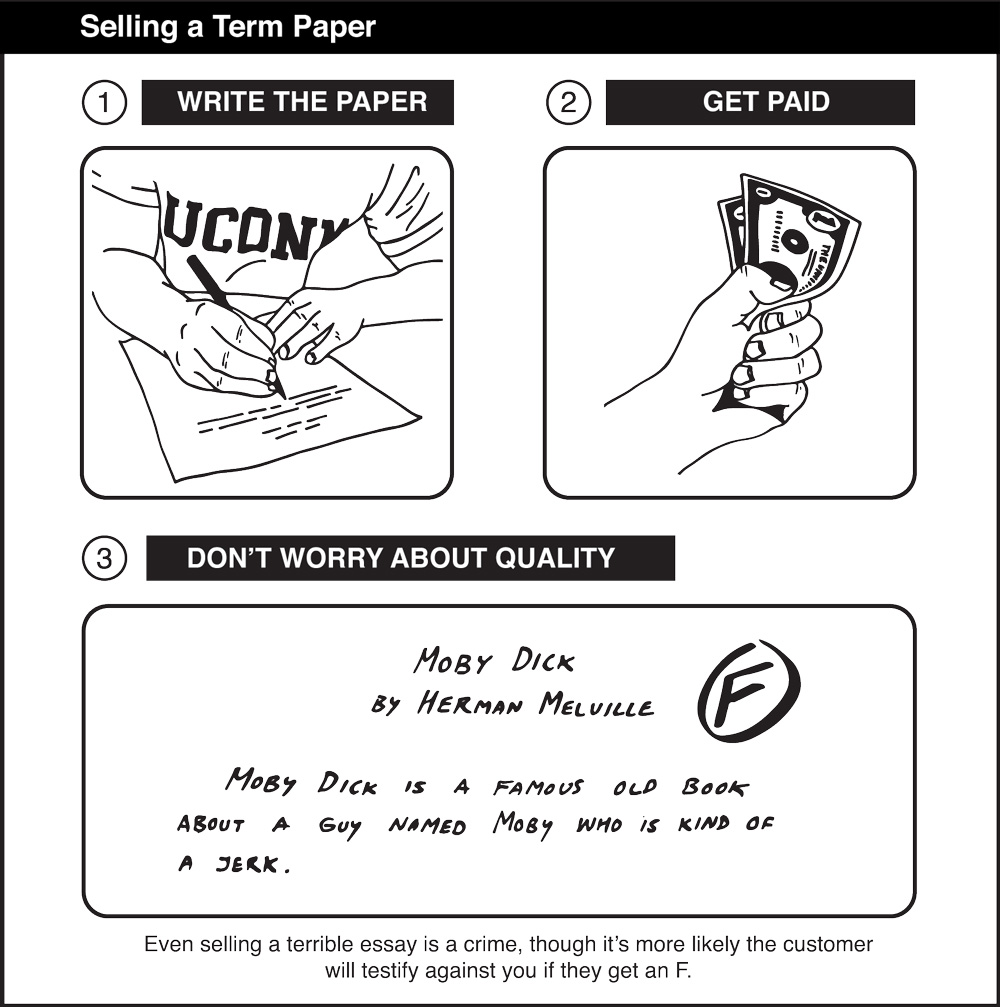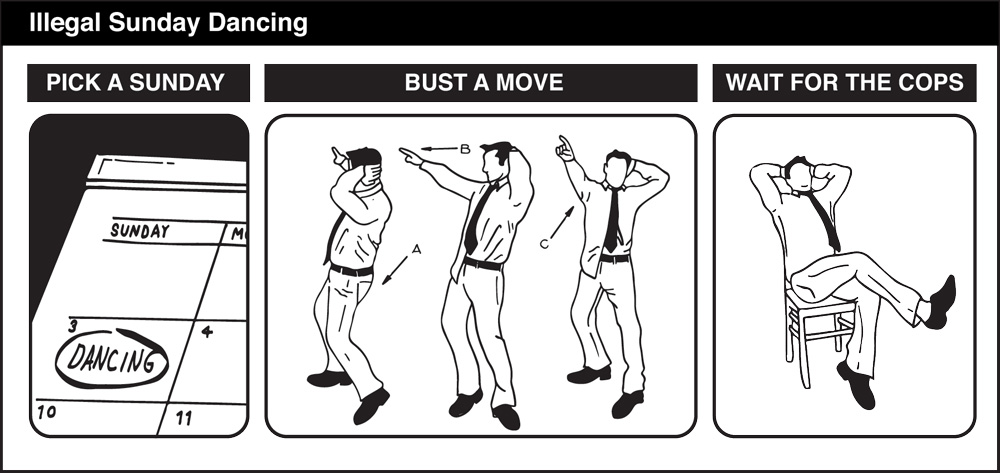Dancing on a Sunday? Don’t Do That!
For the millions of people now stuck inside their homes, boredom is a reality of daily life. Sure, we’re trying to slow the spread of a deadly virus, but all those hours need to be filled somehow. And eventually the mind runs out of completely legal things to do. That’s where crime comes in. Sweet, sweet crime.
Written & Illustrated by Mike Chase ’11 (JD)
O
f course, I’m not talking about the big crimes. Going out and robbing a bank would not be exercising appropriate social distancing. And what’s the point of grand theft auto when there’s no place to go? But take a cruise through the United States Code and the Code of Federal Regulations and you’ll find thousands and thousands of little things that can relieve a bit of boredom and land you in federal prison. If you’re having a hard time finding them, don’t worry — I do it for you daily on my Twitter feed @CrimeADay, where I’ve been counting and posting all the federal crimes on the books every day since 2014. That’s how I know you can’t sell a barrel with an oversized bulge. Shoot a fish from an airplane? Can’t do it. Pretend to be a member of the 4-H club? Off limits. Even mailing a mongoose to someone is a federal crime, no matter how generous your intentions may be.
Of course, I’m not talking about the big crimes. Going out and robbing a bank would not be exercising appropriate social distancing. And what’s the point of grand theft auto when there’s no place to go? But take a cruise through the United States Code and the Code of Federal Regulations and you’ll find thousands and thousands of little things that can relieve a bit of boredom and land you in federal prison. If you’re having a hard time finding them, don’t worry — I do it for you daily on my Twitter feed @CrimeADay, where I’ve been counting and posting all the federal crimes on the books every day since 2014. That’s how I know you can’t sell a barrel with an oversized bulge. Shoot a fish from an airplane? Can’t do it. Pretend to be a member of the 4-H club? Off limits. Even mailing a mongoose to someone is a federal crime, no matter how generous your intentions may be.
Who is Mike Chase?
UConn Law alum Mike Chase is a lawyer by day, mad tweeter and author by night. Want more diabolical crime drawings or to know why these laws are still on the books? Want to aid or abet? Join the fun at @CrimeADay.
Look, obviously you should never commit any crimes no matter how silly. So if I haven’t been clear: don’t commit crimes (they’re making me say that). But what’s a bored member of UConn nation to do in these strange times? Let’s start in the kitchen.
During these fresh-food-challenged times, we’ve all been eating noodles like we did when we were in college. They’re cheap and delicious and they’re in the pantry. Be careful though. If your noodles don’t meet federal specifications you may have to come up with money for a lawyer like me to defend you. For spaghetti, that means you can’t go around making noodles with a diameter of more than .11 inches. Or say you’re more of a macaroni and cheese kind of person. Well, your noodles had better be under .27 inches to keep the feds away. Naturally, you’re wondering: What about ramen? Well, so far, the government is willing to look the other way on that. Plus, federal noodle crimes are only crimes if you’re selling or distributing illicit noodles. Any good noodle lawyer will tell you that. Here’s a chart from my book “How to Become a Federal Criminal” to help you comply.

Other federal crimes you can commit at home might be born out of loneliness. For example, when Skype or Zoom goes down, you might resort to a good old-fashioned CB radio to talk with friends or colleagues. But don’t tell a joke or make a sound effect on that walkie-talkie: both are prohibited by 47 U.S.C. § 501 & 47 CFR § 95.413. Or what about carrying on a conversation with someone you have reason to believe is a pirate (many of my colleagues fall into this category)? Well, that’s prohibited by 18 U.S.C. § 1657 and could get you three years in prison.
Some estimates suggest that there are more than 4,450 federal criminal statutes and more than 300,000 regulations with criminal penalties. That means it’s going to take me until the year 2848 to count them at a rate of one each day. But all Huskies should know that the feds don’t have a monopoly on strange crimes. Connecticut has its own penchant for weird crimes.
For those of us who may have been “enterprising” students during our time at UConn, be advised that Connecticut General Statutes § 53-392b makes it a Class B misdemeanor to write a term paper for someone else. That could mean up to six months in jail if you’re caught writing someone else’s essay. If reading that last part just made you break out in a cold sweat, just act natural and keep reading. And relax, the statute of limitations is just one year.

Connecticut has a long history of making it a crime to have fun, even in trying times. Until 1976, Section 53-300 of the Connecticut Statutes made it a crime for any person to be “present at any concert of music, dancing or other public diversion on Sunday or on the evening thereof . . . ” You don’t have to be lawyer to see that dancing on Sunday was a crime — an actual crime — until not that long ago. Naturally, you’re wondering whether any of these silly crimes could possibly result in a person being charged and convicted. Well, in the 1963 case of State v. Morais, a restaurant owner was charged under the no-Sunday-dancing law. Police showed up at Anthony Romano’s restaurant one Sunday afternoon and said: “If you have dancing, Mr. Romano, someone is going to get arrested.” In response, Romano said, “Well, we’re going to have dancing,” and then he walked away. Awesome response? Yes. Criminal? Also yes.

Heck, even margarine — yes, margarine — has landed Connecticut residents in hot water with the authorities. Both Connecticut and federal law have long made it a crime to give out single servings of unlabeled margarine unless they are triangular in shape. Square margarine, circular margarine, or even rhomboid margarine are illicit in the eyes of the law. Sure enough, in 1952, another Connecticut restaurateur was hauled off by the police when he was busted giving his patrons square pats of margarine.
Now, it might seem like I’m saying that everything is a crime. You might be thinking that it’s impossible to go about your daily life without running afoul of some criminal prohibition among the untold thousands of federal laws on the books. So let me offer a glimmer of hope: I went to the UConn School of Law, and I know a business opportunity when I see it. The more time lawmakers spend pumping out crime after crime, the more job security there will be for the margarine lawyers, the Sunday-dancing lawyers, and the oversized-noodle lawyers among us.
So relax.
In the Moment
Mike Chase ’11 JD worked on this from his home in Granby, Connecticut, while
lawyering, fathering, and tweeting: I always knew it was probably a bad idea to promise the world (or at least Twitter) a new ridiculous federal crime every day, on top of a busy practice representing clients in and out of court. But when the Covid-19 crisis began, so did a set of totally new obligations: fighting for justice remotely and advising clients in a time when prison became an even more dangerous place to be. Luckily, I have my 4-year-old son and 6-month-old daughter to serve as young non-degreed associates and to remind me there’s more to life than just federal noodle crimes.


Leave a Reply